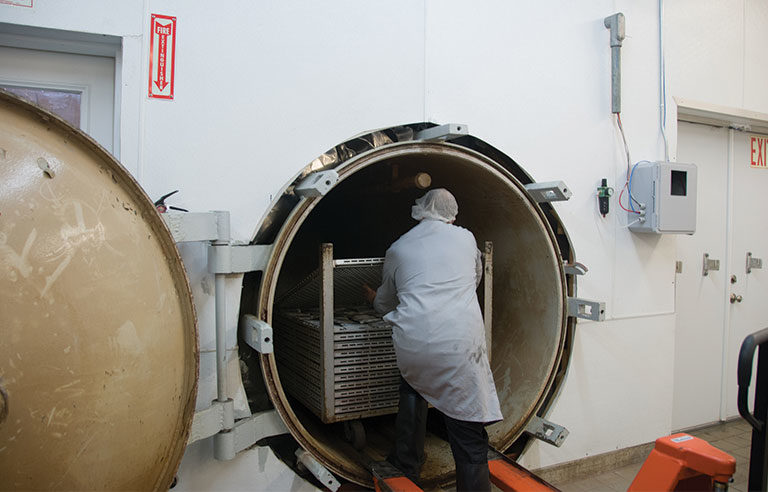On-the-job injuries rising among Oregon seafood-processing workers: study

A cart full of packaged albacore goes into the big retort for high-temperature cooking.
Photo: Pat Kight
Corvallis, OR – Injuries among seafood-processing workers in Oregon have eclipsed the statewide average, and the rate appears to be increasing, according to a recent study from Oregon State University.
Researchers analyzed 188 accepted workers’ compensation claims from 2007 to 2013 that were filed under the “disabling” category – claims involving employees who either missed work, were hospitalized or suffered permanent impairment due to injury. The annual average for the Oregon seafood-processing industry was 24 claims per 1,000 workers. The accepted disabling claims rate for all workers in the state in 2013 was 1.1 per 100 workers, which factors to approximately 11 per 1,000 workers when multiplied, according to a 2014 report from the Oregon Department of Consumer and Business Services.
The seafood-processing industry includes cleaning, canning, freezing, and other packaging and preparation processes.
Other findings from the study:
- 48 percent of incidents resulted from overexertion or bodily reaction.
- 44 percent impacted a worker’s upper extremities.
- 42 percent involved traumatic injuries to the muscles, tendons, ligaments or joints.
- 31 percent resulted from contact with objects and equipment.
“Fortunately, Oregon’s seafood-processing industry did not experience any fatalities during the study period, but the rate of injuries during that period is higher than Oregon’s all-industry average,” lead study author Laura Syron, a doctoral student in Oregon State’s College of Public Health and Human Sciences, said in a press release. “This is an industry that merits more research and more support. Our goal is to use this information to assist seafood-processing companies in the Pacific Northwest with protecting workers’ safety and health.”
The study was published online March 6 in the American Journal of Industrial Medicine.
Post a comment to this article
Safety+Health welcomes comments that promote respectful dialogue. Please stay on topic. Comments that contain personal attacks, profanity or abusive language – or those aggressively promoting products or services – will be removed. We reserve the right to determine which comments violate our comment policy. (Anonymous comments are welcome; merely skip the “name” field in the comment box. An email address is required but will not be included with your comment.)

